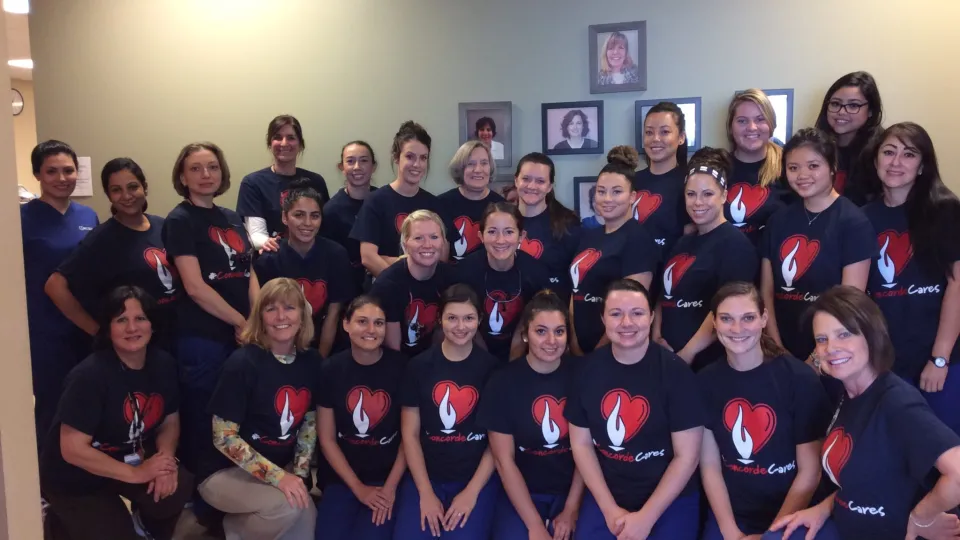
The issue that ranks No. 1 among patients bringing to dentists or dental hygienists has nothing to do with dental hygiene and everything to do with appearance.
"Whitening is usually the top priority for our patients, regardless of other urgent periodontal or caries concerns," said Diane Osso, Dental Hygiene Program Director at Concorde's campus in Aurora, Colo.
Teeth whitening is big business, whether performed in the dentist's office by a professional in dental hygiene or at home with an over-the-counter product.
"The American Association of Orthodontics found that nearly 90 percent of all patients requested tooth whitening," said Lisa Mayo, RDH, BSDH, MHA, Dental Hygiene Program Director at Concorde's campus in San Antonio, Texas. "Professional strength whitening can add more sparkle to your teeth with very few risks."
Why, despite good Dental Hygiene, teeth change color
Your teeth can go from white to not-so-bright for a number of reasons, according to the American Dental Association.
- Food and drink. Coffee, tea, and red wine are some major staining culprits.
- Tobacco use. Tar and nicotine are two offenders in staining teeth.
- Outer enamel thins over time, leaving a more yellowish under-layer of dentin exposed.
- Your tooth might lay down more dentin as a reaction to injury if you've been hit in the mouth.
- Tooth darkening is a side effect of certain antihistamines, antipsychotics, and high blood pressure medications.
What are the whitening options?
Teeth whitening is a simple process. Whitening products contain one of two tooth bleaches - hydrogen or carbamide peroxide. Patients have three options to whiten teeth. Most widely used are whitening toothpaste contain chemical or polishing agents. There is in-office bleaching applied by a dentist or someone who has graduated from a dental hygienist program. Another is at-home bleaching, such as whitening strips or gels that stick to your teeth.
"There are really no risks to tooth whitening treatments that have been prescribed by dentists if the patient is evaluated for existing dental decay and restorations," said Kirsten Roling, DDS, Director of Dental Hygiene at Concorde's campus in Garden Grove, Calif.
There might be a few small risks
Osso points out a few risks associated with whitening.
- Sensitive teeth. "Gum line recession exposes the root of the tooth, which contains many microscopic dentinal tubules," Osso said. "These tubules contain fluid that leads to the pulp of the tooth. When bleached, these tubules can lose their protective 'plug,' making exposure to hot or cold foods unpleasant."
- Sensitive Gums. Delicate tissues can become burned with the bleaching process.
- Bleaching before getting teeth cleaned can cause uneven results due to surface stains and deposits preventing the ability to get all surfaces equally bleached.
- Certain enamel conditions do not get good results from bleaching. These include enamel dysplasias such as fluorosis, tetracycline staining, and other birth or illness defects.
- Patients drinking a lot of red wine, coffee, tea, and/or smoke before, during, or after bleaching will not get the best results.
"New products on the market continually diminish the risks," Osso said. "Products over the counter have gotten easier to use and more affordable for all. In-office is stronger, faster and the better option to achieve the most dramatic whitening results. But the cost is typically at least five times greater than purchasing at the local drug store."
"The rewards of bleaching are huge. White teeth are considered the picture of youth. A smile goes a long way and a white smile is an eye-catcher to get noticed."
Interested In How To Become a Dental Hygienist?
Click here to explore Concorde Dental Hygiene Programs near you!Take The Next Step Towards a Brighter Future
We have a Concorde representative ready to talk about what matters most to you. Get answers about start dates, curriculum, financial aid, scholarships and more!




